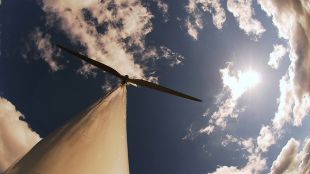
In our ozone-depleted era, many ecological activists assume that any form of non-fossil fuel is a welcome fuel, but Laura Israel's muckraking documentary Windfall clobbers this assertion. And to be clear: the picture isn't the reactionary trounce on greenhouse claims and alternative energies that one might infer from this posturing; far from it. Israel and many of her subjects do make it abundantly clear that they harbor a fundamental concern about environmental damage and are ready to embrace many different options for cleaner power sources. But one that they won't soon warm up to is systematized wind power -- particularly the sprawling wind farms proposed for rural Meredith, NY, a dwindling farming community that is apparently in desperate need of sustenance.
Israel's film -- comprised mostly of interviews with Meredith townspeople -- visits the community not long after several multinationals rolled into town, promising economic revitalization in return for signed contracts that would permit them to construct and mount dozens of 400-ft.-high wind turbines on farm land. The suits, of course, neglected to disclose some of the health hazards wrought by the ceaseless whirring and grinding of the huge structures and their intermittent blockage of sunlight -- for example, sleep loss, depression, and increased stress. Before long, the town split into two factions -- those who saw the oscillating blades as a means of economic deliverance, and those who perceived them as a scourge on the land and a threat to local well-being.
At times, Israel's documentary hints at a desire to pull the audience into this small-town debate and explore both sides of the issue, but this doesn't really happen. In more mature and ambitious hands, this material would have tapped into some ambiguities surrounding wind power in Meredith, disclosing both the assets and the liabilities of the proposed development. A tip-off to the oversimplified nature of Israel's film is the fact that she fails to provide any interviews with representatives of the power companies, or even with townspeople who are completely pro-wind, such as a longtime female spokesperson for the town planning board, who is seen only in long shot and comes off like a venomous monster here.
Instead, what we get is an invective -- a polemic, damning the turbines as a ludicrous impracticality. To Israel's credit, this does come off; her presentation is well-conceived, intelligent, and affecting. She demonstrates a fine ability to select strategic sound bites and structure her material narratively, and builds a convincing case for her central agenda; we walk away firmly convinced that wind power spells the destruction of Meredith. Moreover, the picture (despite an initial case of stop-motion and time-lapse cuteness that only mars the first few minutes) is also visually impeccable: cinematographer Brian Jackson smoothly lights and frames interviewees, and makes frequent use of landscape photography, emphasizing a palette of rich, earthy green and brown hues that feels ideally suited for the rurality of the time and place. That aesthetic approach undergirds the documentary's central strength, perhaps an accidental one: it works far better as a stirring, bittersweet, occasionally droll portrait of early 21st century small town Americana (a series of quirky character studies) than it does as an anti-wind power (or anti-corporate) screed. In fact, the movie is so enjoyable in the moments it catches accidentally -- eccentric behavioral quirks of the interviewees, for example -- that one almost wishes Israel had ankled the environmental issue altogether.
As the film stands, it works effectively enough, and Israel doubtless has a long career as a documentarian in store for her, though throughout the picture we can imagine a better film that might have been; the scattered flecks of ambiguity recall Joe Berlinger's Crude, for example, while the biographical glimpses of the townspeople suggest the Ross brothers' 2009 documentary 45365, a multifaceted slice-of-life portrait of a Middle American community. A few further steps in either direction would have improved Windfall considerably. As a result, one hopes that Israel's next directorial outing will take bolder risks with its content.
